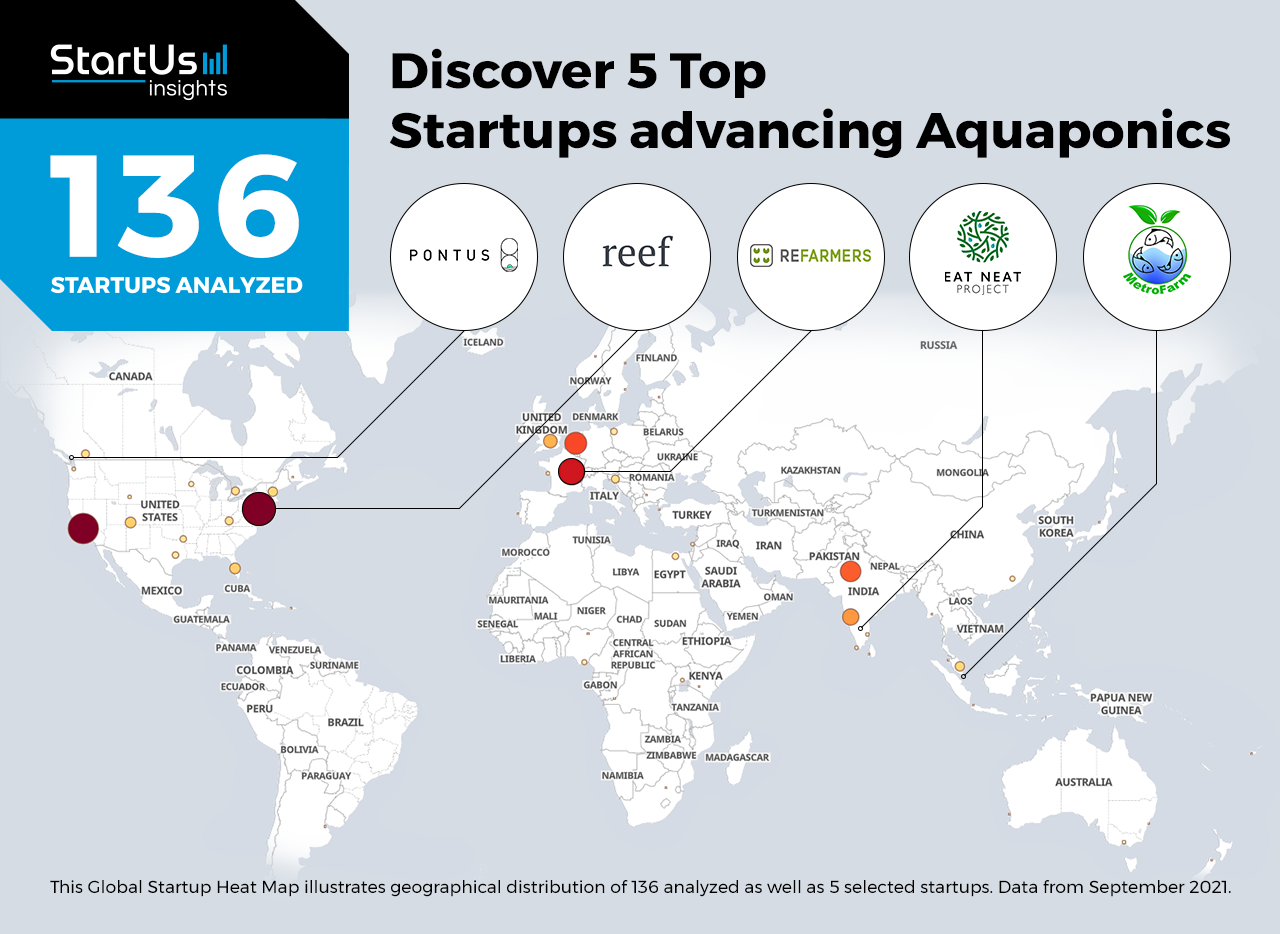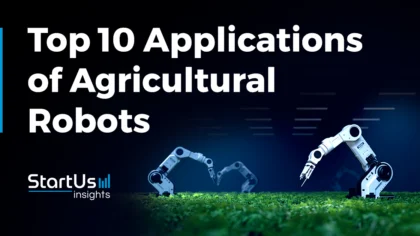Staying ahead of the technology curve means strengthening your competitive advantage. That is why we give you data-driven innovation insights into the agriculture sector. This time, you get to discover 5 hand-picked startups advancing aquaponics.
Global Startup Heat Map highlights 5 Top Startups advancing Aquaponics out of 136
The insights of this data-driven analysis are derived from the Big Data & Artificial Intelligence-powered StartUs Insights Discovery Platform, covering 2 093 000+ startups & scaleups globally. The platform gives you an exhaustive overview of emerging technologies & relevant startups within a specific field in just a few clicks.
The Global Startup Heat Map below reveals the distribution of the 136 exemplary startups & scaleups we analyzed for this research. Further, it highlights 5 AgriTech startups that we hand-picked based on criteria such as founding year, location, funding raised, and more. You get to explore the solutions of these 5 startups & scaleups in this report. For insights on the other 131 aquaponics solutions, get in touch.
Metrafarm offers Aquaponics Farming Systems
Both hydroponics and aquaculture have multiple benefits over growing food on lands such as lower emissions and higher yield per acreage. Aquaponics combines these two in a symbiotic, closed-loop setting in which fish produce nutrient-rich waste and the plants absorb the nutrient, recycling freshwater back. To advance circularity and sustainability in food production, AgriTech startups are developing aquaponics farming systems.
Singaporean startup Metrafarm builds smart aquaponics farming systems. The startup’s Oceansing Aquaponics System (OAS) features fish rearing tanks, filter tanks, degaussing tanks, and planter tanks. The closed-loop, self-sustainable system uses solar energy to maintain the water pump and indoor lighting. It is easy to maintain and provides higher yields, while also eliminating the risk of mosquito outbreaks from waterlogging.
Eat Neat Project advances Urban Aquaponics
Most cities do not have the scale of land and water resources required for conventional farming techniques. However, growing food locally reduces the carbon emissions of the agriculture sector significantly. To this end, urban farming is a promising alternative to make cities self-reliant in tackling food poverty. That is why startups are designing aquaponics systems that grow food with a smaller footprint.
Indian startup Eat Neat Project develops an integrated aquaponics farm. The startup customizes the aquaponics systems according to the customer’s requirement and site inspection. It provides 2-4 times higher yield than traditional farming practices while using 95 % less water. This allows urban farmers to grow fruits and vegetables responsibly and with much less or without the use of pesticides.
Refarmers enables Vertical Aquaponics
Urban spaces generally don’t have much spare space, but the landscape is often marked with tall buildings. Therefore, vertical farms are more suited as a method of onsite food production for urban farmers. Tubings in aquaponics towers also provide more space for plants to grow, further enhancing the yield per square meter. This is why AgriTech startups are combining aquaponics with vertical farming techniques.
Refarmers is a French startup that provides vertical aquaponic and hydroponic greenhouses. It uses automation, monitoring, fertigation, and other AgriTech technologies to enable indoor farming. After performing due diligence and feasibility analysis, the startup helps urban farmers install vertical farming solutions in their buildings. In addition to bringing food production closer to people, the startup’s solutions also facilitate waste-to-food recycling and social inclusion.
Pontus provides Plant-based Protein
The popularity of plant-based protein is on the rise in recent years as consumers switch to transition alternatives to animal agriculture. However, growing crop plants also require a significant amount of land and other resources. This is why food and agriculture startups are utilizing scalable technologies like aquaponics and hydroponics to produce plant-based protein.
Pontus is a Canadian startup that uses aquaponics to sustainably produce plant-based protein. It grows water lentils, a rich source of B vitamins, and transforms them into protein-dense powder. Pontus’ Closed Environment Vertical Aquaponics System (CEVAS) leverages artificial intelligence (AI) and control technologies to optimize environmental parameters inside the aquaponics farm. This improves yield, saves energy, as well as enhances the health of the plants and fish.
reef develops an Automated Aquaponics System
In recent years, more consumers are buying medicinal plants such as cannabis or aloe vera, or their products. However, they lack information on whether these plants are organically grown and ethically sourced. This is why startups now offer indoor gardening units for medicinal plants. With automation, such units empower individuals without any farming experience to easily cultivate plants.
US-based startup reef offers an automated aquaponics system to grow medicinal plants at home. The startup’s system automatically adjusts the environmental conditions to optimize plant growth. Moreover, it automates feeding fish, nutrient delivery, and aquarium biofiltration. With the convenience of a mobile app, reef’s solution enables individuals to grow organic plant medicines.
Discover more AgriTech Startups
AgriTech startups such as the examples highlighted in this report focus on urban farming, vertical farming, and hydroponics. While all of these technologies play a major role in advancing the agricultural industry, they only represent the tip of the iceberg. To explore more agricultural technologies, simply get in touch to let us look into your areas of interest. For a more general overview, you can download our free AgriTech Innovation Report to save your time and improve strategic decision-making.










